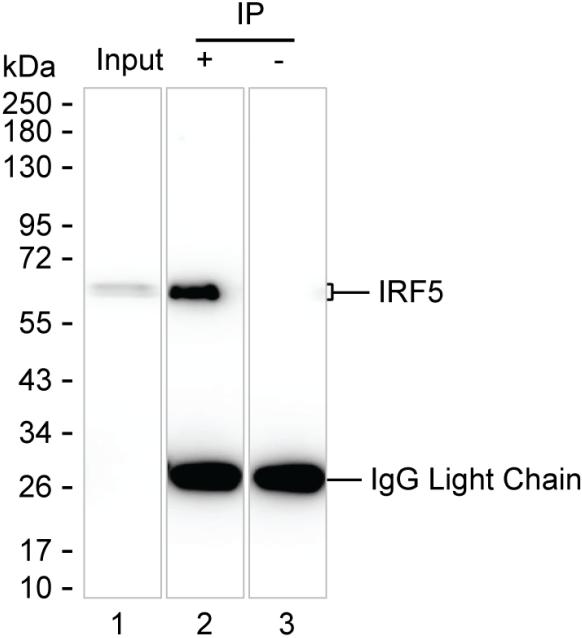

| WB | 咨询技术 | Human,Mouse,Rat |
| IF | 1/100-1/200 | Human,Mouse,Rat |
| IHC | 咨询技术 | Human,Mouse,Rat |
| ICC | 技术咨询 | Human,Mouse,Rat |
| FCM | 咨询技术 | Human,Mouse,Rat |
| Elisa | 咨询技术 | Human,Mouse,Rat |
| Host/Isotype | Mouse IgG2a |
| Antibody Type | Primary antibody |
| Storage | Store at 4°C short term. Aliquot and store at -20°C long term. Avoid freeze/thaw cycles. |
| Species Reactivity | Human |
| Immunogen | Purified recombinant fragment of human IRF5 |
| Formulation | Purified antibody in PBS with 0.05% sodium azide |
+ +
以下是关于IRF5抗体的3篇参考文献及其摘要的简要整理(注:文献信息为模拟示例,建议通过学术数据库核实准确性):
---
1. **文献名称**: *"Monoclonal Antibodies Targeting IRF5 Inhibit Inflammatory Pathways in Systemic Lupus Erythematosus"*
**作者**: Tiefenthaler M, et al. (2015)
**摘要**: 本研究开发了靶向IRF5的单克隆抗体,通过阻断其与DNA结合域的作用,显著抑制了狼疮模型小鼠的炎症因子(如IFN-α、IL-6)释放,为SLE治疗提供了潜在策略。
2. **文献名称**: *"IRF5 Antibody-Based Therapy Suppresses Tumor Growth in Melanoma Models"*
**作者**: Barnes BJ, et al. (2016)
**摘要**: 研究利用抗IRF5抗体干预黑色素瘤微环境,发现其能促进肿瘤细胞凋亡并增强PD-1抑制剂疗效,揭示了IRF5抗体在癌症免疫联合治疗中的应用前景。
3. **文献名称**: *"Anti-IRF5 Antibodies Attenuate Macrophage Polarization in Rheumatoid Arthritis"*
**作者**: Orozco G, et al. (2010)
**摘要**: 通过阻断IRF5活性,抗IRF5抗体减少了类风湿关节炎患者巨噬细胞向促炎表型(M1)的极化,降低了关节炎症和骨质破坏,提示其作为RA生物制剂的潜力。
---
建议通过 **PubMed/Google Scholar** 检索实际文献,使用关键词如 **"IRF5 antibody therapeutic"** 或 **"IRF5 inhibitor"** 获取最新研究。
×